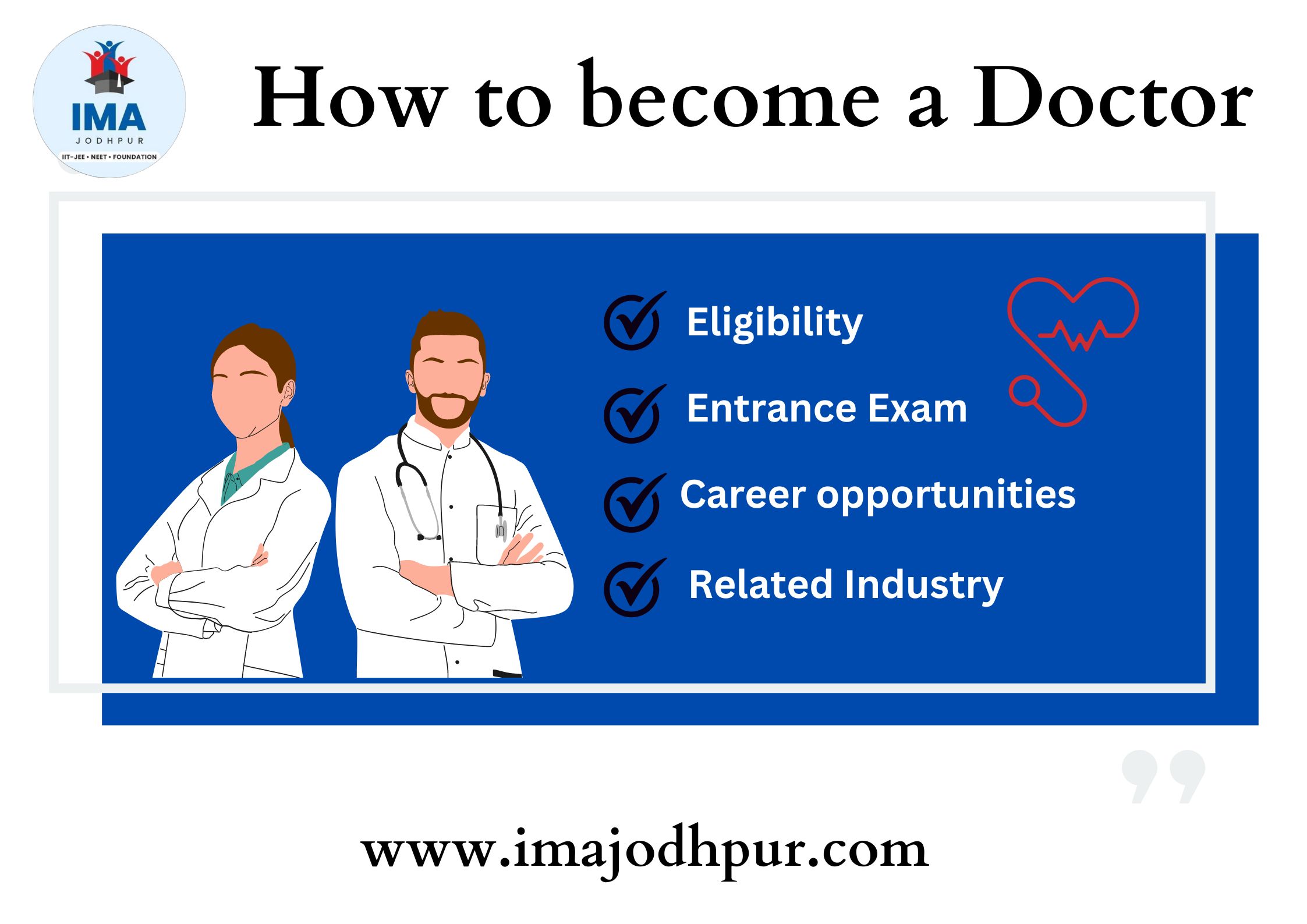
Becoming a doctor is a noble and challenging pursuit, requiring dedication, perseverance, and a deep passion for medicine and helping others. It involves several years of education, training, and practical experience. Is being a doctor your dream profession? If yes, then this blog is for you! Take a look at this blog to get an idea about how to become a doctor. Eligibility 10+2(science stream), Cleared Entrance Exam Entrance Exam NEET, NEET MDS, AIIMS Career opportunities Multi Speciality Hospitals, Government Hospitals, Healthcare Centers, Pharmaceutical and Biotechnology Companies Related Industry Healthcare Here's a breakdown of the steps involved: Premedical Education: High School: Focus on excelling in science courses like biology, chemistry, and physics. Take advanced science classes if available and maintain a strong GPA. Undergraduate Degree: Earn a bachelor's degree, preferably in a science-related field like biology, biochemistry, or human anatomy. A strong foundation in these subjects will prepare you for the rigors of medical school. Medical School Admission: Entrance Exams: Take the relevant standardized entrance exam such as NEET (National Eligibility Cum Entrance Test). Aim for a high score to increase your chances of admission into a competitive medical school program. Application Process: Research and apply to accredited medical schools that align with your interests and career goals. Prepare for interviews and highlight your academic achievements, extracurricular activities, and motivations for pursuing medicine. Medical School: Medical Degree: Dedicate yourself to four years of intensive medical school coursework covering anatomy, physiology, pathology, pharmacology, and clinical sciences. Develop strong critical thinking, problem-solving, and communication skills. Clinical Rotations: Gain practical experience through clinical rotations in different medical specialties like internal medicine, surgery, pediatrics, and psychiatry. Refine your diagnostic and clinical skills while interacting with patients under the supervision of experienced doctors. Residency: Specialization: Choose a medical specialty to focus on, such as family medicine, cardiology, or neurology. Enter a residency program in your chosen field, typically lasting 3-7 years, depending on the specialty. Advanced Training: Immerse yourself in hands-on training under the guidance of senior physicians. Hone your clinical skills, learn advanced procedures, and acquire the expertise necessary for independent practice. Licensure and Certification: Licensing Exams: Pass the relevant national licensure exams, such as the USMLE (United States Medical Licensing Examination) or COMLEX-USA (Comprehensive Osteopathic Medical Licensing Examination) for DOs (Doctors of Osteopathic Medicine). Professional Certification: Depending on your specialty, consider pursuing additional certifications or fellowships to further enhance your qualifications and expertise. Role and Responsibility of doctors: Doctors play a vital role in society, serving as guardians of our health and well-being. Their responsibilities are vast and multifaceted, encompassing a range of duties from diagnosis and treatment to patient education and advocacy. People can be general doctors or they can gain mastery in one or two fields. A doctor (or physician) is a licensed medical professional who ensures health care and health-related facilities. Doctors operate individually and are also seen in hospitals, emergency rooms, labs, or other institutions.The basic jobs of a doctor include the following. They ask and analyse the patient’s concerns. Doctors also probe patients and ask about the various symptoms or concerns they are facing. Doctors make a prognosis by making educated guesses or even perform physical tests. After prognosis, doctors identify what’s wrong with the patient and diagnose them with accurate illness. They then prescribe medicines and propose a treatment plan to cure the patient’s condition. Fields of Specializations It is here that specialization in a particular branch of medicine becomes a necessity. The major Specializations include General Medicine, General Surgery, Pediatrics, Obstetrics & Gynecology, Dermatology, Ophthalmology, Orthopedics, ENT (Ear, Nose and Throat), Psychiatry, Anesthesiology etc. There are also Super Specializations which require a further 3-5 years of study in areas such as Plastic Surgery, Neurosurgery, Cardio-thoracic surgery, Conito-urinary surgery, Pediatric Surgery, Gastroenterology, Endocrinology and Clinical Hematology. Skills Required to Become a Doctor The following are the skills required to become a doctor: Leadership skills Critical thinking Teamwork Time management and organization Compassion Problem solving abilities Quick thinking Critical analysis Active hearing Conclusion Remember, the path to becoming a doctor is challenging and requires dedication, hard work, and a genuine interest in helping others. Additionally, requirements may vary by country, so it's essential to research and understand the specific steps and qualifications needed in the region where you plan to practice.